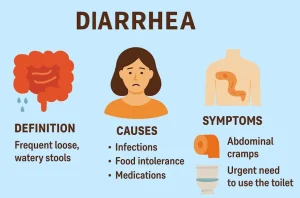Overview
Diagnosis
Your healthcare professional will start by asking about your medical history, reviewing any medicines you are currently taking, and conducting a physical examination. To identify the cause of diarrhea, several diagnostic tests may be recommended.
Common diagnostic tests include:
-
Blood tests: These may include a complete blood count, electrolyte measurement, and kidney function tests to determine the severity of dehydration or infection.
-
Stool test: A stool sample may be analyzed to check for bacterial, viral, or parasitic infections that could be causing diarrhea.
-
Hydrogen breath test: This test helps detect lactose intolerance. After consuming a lactose-rich liquid, your breath is analyzed for hydrogen levels. High hydrogen levels indicate poor lactose digestion and absorption.
-
Flexible sigmoidoscopy or colonoscopy: Using a lighted tube inserted into the rectum, a medical professional examines the inside of the colon. A biopsy may be taken for further evaluation. Sigmoidoscopy views the lower colon, while colonoscopy examines the entire colon.
-
Upper endoscopy: This procedure involves a long, flexible tube with a camera to inspect the stomach and upper small intestine. Tissue samples may be collected for laboratory testing.
Treatment
Most cases of acute diarrhea resolve naturally within a few days. However, if symptoms persist despite home remedies, medical treatment may be required.
Antibiotics or antiparasitics
If diarrhea is caused by certain bacteria or parasites, your healthcare professional may prescribe antibiotics or antiparasitic medications. However, most bacterial causes do not require antibiotics, and viral infections will not respond to them.
Treatment to replace fluids
Rehydration is the most essential part of diarrhea treatment. Replacing lost fluids and electrolytes helps prevent dehydration.
-
For adults, this may include drinking water with electrolytes, juices, or broths.
-
If oral intake causes nausea or vomiting, intravenous (IV) fluids may be given.
-
Water alone does not replace lost electrolytes such as sodium and potassium, so consuming fruit juices or soups can help maintain balance.
-
For children, oral rehydration solutions like Pedialyte may be recommended by a doctor.
Adjusting medicines you are taking
If diarrhea is linked to certain medications, such as antibiotics, your healthcare professional may adjust the dosage or switch to an alternative medicine.
Treating underlying conditions
When diarrhea results from chronic or serious conditions like inflammatory bowel disease (IBD), treatment focuses on managing the underlying disorder. You may be referred to a gastroenterologist to develop a personalized treatment plan.
Advertisement

